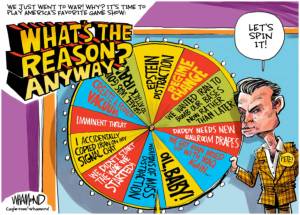Court tilts against precedent
Published 6:56 pm Monday, June 30, 2014
The Supremes, for all their talent, can’t carry a tune.
Monday’s dissenting opinions in Burwell v. Hobby Lobby and Harris v. Quinn illustrate the U.S. Supreme Court’s inharmonious divide. And when the public interest aligns with dissenting opinion, as it does in both rulings, Americans feel the sting.
Neither decision was comprehensive. Instead, they chisel away at the status quo, creating the legal scaffolding for future Supreme Court monkeying.
The Hobby Lobby decision, which says that employers can withhold certain birth control methods from insurance coverage because of the Religious Freedom Restoration Act, just applies to closely held for-profit corporations built around religious principles. But it’s a corrosive precedent, written by five uterus-free conservatives, that imparts religious protections to commercial, for-profit enterprises.
“The court’s expansive notion of personhood invites for-profit entities to seek religion-based exemptions from regulations they deem offensive to their faiths,” writes Justice Ruth Bader Ginsburg in her dissent. “The court, I fear, has ventured into a minefield.”
Harris v. Quinn is a narrow, complex decision that recasts home-care aides as “partial” public employees who should not be required to pony up union dues. Is “narrow” an appropriate descriptor?
No, writes legal analyst Jeffrey Toobin. “It’s generally a two-step process: in confronting a politically charged issue, the court first decides a case in a ‘narrow’ way, but then uses that decision as a precedent to move in a more dramatic, conservative direction in a subsequent case.”
In Harris v. Quinn, the court did not strike down the 1977 Abood decision which gave the OK for requiring union dues as long as the money doesn’t underwrite political activities.
“The decision at a minimum likely applies to home health-care workers, family child-care providers and language access providers (it may also impact others),” writes the Washington Policy Center’s Jason Mercier.
As University of Washington Prof. Jake Rosenfeld observes in a Monday Politico commentary, Harris v. Quinn likely puts the kibosh on unions representing home health-care aides. But the labor movement shouldn’t hitch its future to public-sector organizing. Rosenfeld underlines in his book, “What Unions No Longer Do,” that four-fifths of Americans are employed in the private sector. They need to be labor’s strategic focus.
UW Harry Bridges Labor Chair George Lovell is pessimistic. The decision could be a blow to organizing around minimum wage and other issues critical to low-wage workers. Organizing requires a sustainable revenue source, and that just went “poof.”
“It’s death by a thousand cuts,” Lovell said. It’s also why federal elections matter.


